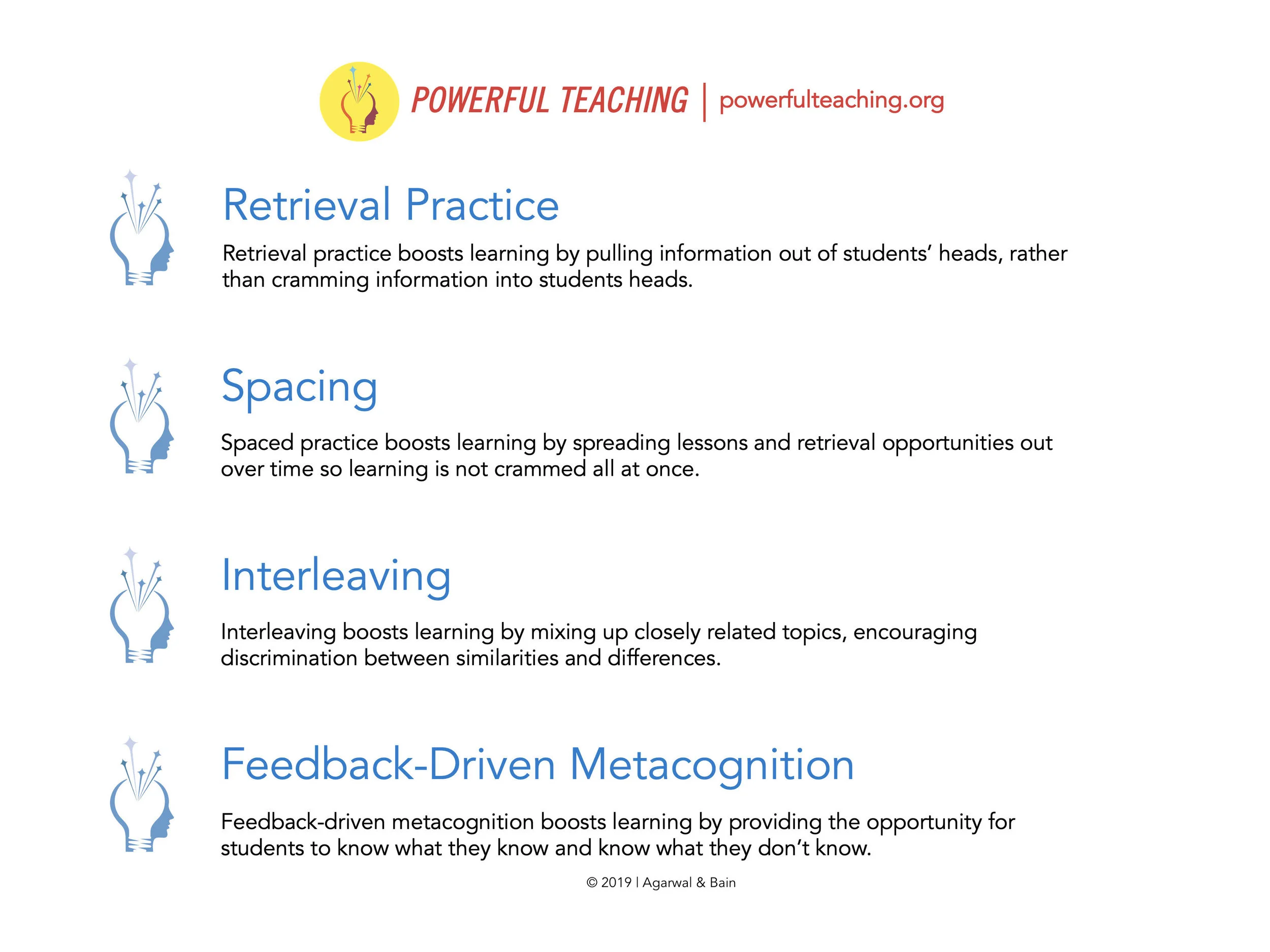Chapter 1: Discover the Power Behind Power Tools
As we all know, we could fill warehouses with all the books, blogs, and worksheets out there, promising to transform your classroom.
Powerful Teaching is more than just another promise. Powerful Teaching is different. How?
It’s based on rigorous research by cognitive scientists
It’s based on decades of experience by classroom teachers
In Powerful Teaching, we show you how to harness four evidence-based strategies, which we call Power Tools: Retrieval practice, spacing, interleaving, and feedback-driven metacognition.
When it comes to Power Tools, we’re all about being practical. No need to revamp what you’re already doing! Here’s why:
You already use Power Tools. Retrieving what we know, spacing it out over time, mixing it up, and giving our students feedback are no-brainers! They're intuitive strategies and that’s what makes them so simple and flexible. And they're not new – 100 years of research demonstrate they significantly improve learning. You can harness these evidence-based strategies that have stood the test of time and make them a regular part of your classroom practice.
You don’t have to spend more time grading. Will Power Tools increase grading time? No! In fact, keeping these strategies as grade-free as possible lowers the stakes and increases learning. We’ll talk about how to remove grades all together. There’s no need to collect papers, assign points, or enter anything into the gradebook.
You’ll save time, not spend it. Engaging students in Power Tools might take a tiny amount of class time (one minute or less, we promise). But in the long-term, students will remember more and you can re-teach less. In fact, just a few quick quizzes in K-12 classrooms have raised students’ grades from a C to an A. You’ll learn more about small strategies that make a big difference for students.
You can use Power Tools your way, in your classroom. From preschool through medical school, and biology to sign language, these strategies increase learning for diverse students, grade levels, and subject areas. There are multiple ways to use these strategies to boost students’ learning, making them flexible in your classroom, not just any classroom.
You can use Power Tools for free. Yes, free. There are many great technology websites, tools, and apps available that take advantage of these strategies, but old fashioned paper and pencil are perfect, too.
Evidence-based strategies that are simple, quick, flexible, and free – too good to be true? Definitely not! By the end of this book, we hope to convince you that these strategies answer a number of today’s challenges when it comes to teaching and learning – precisely because they’re research-based and classroom-proven.
Even if you’re already using Power Tools, how learning works isn’t always intuitive. Consider these myths about learning, which you’ll read more about throughout the book:
Myth: When students learn something easily, they will remember it well.
Myth: Forgetting should be prevented as much as possible.
Myth: It’s better for learning if we give feedback before students make errors.
In this book, we focus on how students learn, not what students learn. While we give examples from teachers in a variety of content areas, we don't focus on content-specific knowledge because research demonstrates that Power Tools are effective for all content areas. Because you know your classroom best, we will help you take these flexible research-based strategies and unleash them your way, with your content, in your classroom.
When it comes to Powerful Teaching and Power Tools, one teacher put it best: “I do this all the time, but it’s nice to have a name and know why it works.”
Excerpted with permission from the publisher, Wiley, from Powerful Teaching by Pooja K. Agarwal, Ph.D. and Patrice M. Bain, Ed.S. Copyright © 2019 by Pooja K. Agarwal and Patrice M. Bain. All rights reserved. This book is available wherever books and eBooks are sold.


